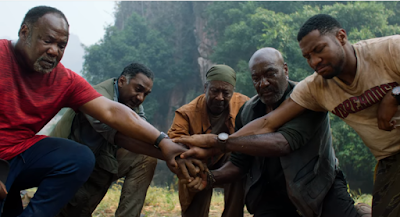Da 5 Bloods (Dir. Spike Lee, Netflix, 2020)
This searing drama finally gives voice to Black American Vietnam vets.
In Spike Lee's timely Da 5 Bloods, the film chronicles the journey of four African American Vietnam veterans who return to the country they once shed blood on to found a promising plot of gold and their squad leader's remains, Stormin' Norman (Chadwick Boseman). The film begins with archival footage of Vietnam war battles, Muhammad Ali, and other tumultuous events that occurred during the late 1960s. The film gives voice to black soldiers who comprised the majority of those on the frontlines during the war.
In the present day, Paul (Delroy Lindo), Otis (Clarke Peters), Eddie (Norm Lewis), and Melvin (Isiah Whitlock, Jr) meet up in Ho Chi Minh City with the promises of retrieving a plot of gold and their fallen squad leader's remains. Throughout the film, it shows the struggles between man and nature, and the looming effects war has on the central characters, especially Paul. His PTSD is triggered by the Vietnamese citizens which causes him to last out a local merchant which he finally admits that he suffers from PTSD.
Songs from Marvin Gaye's ever relevant album, What's Going On is used as the underlying score throughout the film. At the beginning when the men reunite at a bar, they are seen dancing to Got to Give it Up, which was not apart of the album, but from a work later on in his career. When hiking to their destination, they are together singing, What's Happening, Brother. Other music that defined the era can be heard throughout the film. In Paul's death scene, he is last singing the song God Is Love before being executed by the gunmen.
 |
| From L-R: Delroy Lindo, Clarke Peters, Chadwick Boseman, Isiah Whitlock, Jr, and Norm Lewis. |
I was disappointed with how underutilized Chadwick Boseman was in the film as I expected him to have a larger part from the trailers I saw before the film's release. His character was the embodiment of the black power struggle during the era. A scene which reflects this is when they receive news from Hanoi Hannah that Martin Luther King, Jr has been assassinated. Each character's reaction to the news reveals a crushing betrayal felt by them as they come to face that they have been sent to fight in a foreign land for a country that still does not respect their rights or see them as second class citizens. Afterwards, they proceed to have celebratory gunfire as a means to let out frustration from the news.
 |
| Courtesy of People Magazine. |
At first I didn't understand why younger actors weren't used in the flashbacks, but then after going back and watching it a second time, I saw the value in using the actors as the same age. I felt that the actors were not replaced with younger actors in the flashbacks to show that PTSD and the trauma from war stays with someone regardless of age, which is evident with Paul. I did not expect the film to be action packed as I saw it as a reflection of their time in Vietnam and how they carried the trauma with them into old age. I thought the love interest dynamic with David and Hedy to have been unnecessary, but as the film progressed it added a layer to the film's ending.
The film also depicted the importance of platonic familial love as an act of resistance. The relationship between Paul and David as father and son shows the gap between generations and can lead to misunderstanding. Paul, Otis, Eddie, and Melvin depict bonds that can last through time, even showing how they would all die to protect one another in the end. I felt that the archival footage that was shown at the beginning and end of the film shows the veterans were unable to escape this point in time. I also saw the words from Muhammad Ali at the beginning to exemplify triumph and the speech from Dr. King, which was a speech a year prior to his assassination as being a sacrifice for a greater cause.
 |
| Courtesy of The New York Times |
I was disappointed by the fact that all of the characters except Otis died without retrieving the gold that they found. Then I thought that their deaths were sacrifices for the death of Norman, especially Paul. I understood him dying as a means to rectify and relieve himself of the guilt of accidentally killing Norman. I had wanted the film to end with them finding the gold and along with Norman's remains and returning home. Then as the film concluded, I saw their deaths as sacrifices for a greater cause with each of them having died to donate the money from the gold to charitable organizations. I also saw Jean Reno's character as having been underutilized as well. Desroche and his henchman was used to thwart the five bloods from getting the gold and returning home.
Hopefully Da 5 Bloods will be in consideration for awards in the upcoming award season, as well as Delroy Lindo receiving accolades for his performance. Overall, I rate this movie a 8.5 out of 10.



Comments
Post a Comment